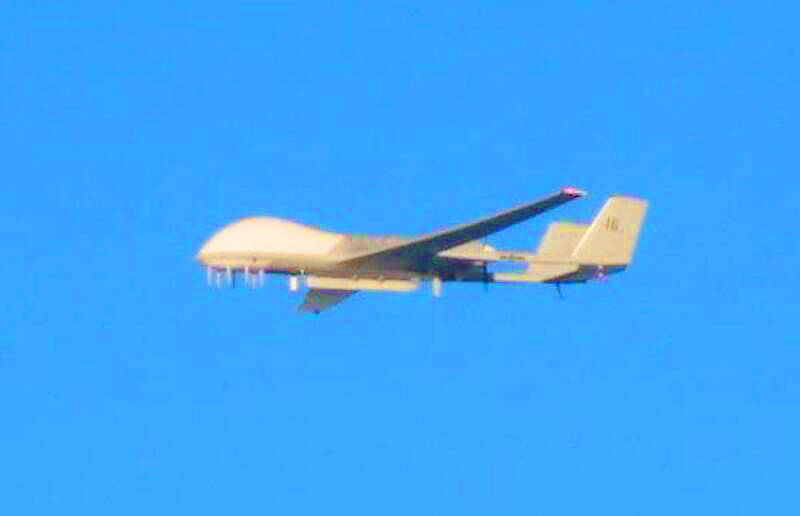China appears to be using a new type of BZK-005 drone that might be capable of disrupting the radio communications in the Taiwanese military and causing the radar system to malfunction, a military source said yesterday.
The military is closely monitoring traces of this upgraded drone after the Japanese Ministry of Defense recently captured images of a BZK-005 drone, which had a large number of antennas under the nose of the aircraft and a pod of unknown purpose attached under the belly of the craft.
Defense experts in other countries had warned that the Chinese People’s Liberation Army (PLA) has bolstered its electronic warfare capability by installing antennaes and pods on some of the drones, a military source told the Liberty Times (sister paper of the Taipei Times), adding that they could be deployed to disrupt all radio communications within the chain of command in the Taiwanese military and cause the radar system to malfunction.

Photo: Screen grab from Japan’s Ministry of Defense Web site
Drones equipped with electronic warfare capabilities would also make it difficult for the Taiwanese military to accurately launch missile attacks and intercept Chinese missiles and aircraft.
The PLA would attempt to use such interference in the initial stage of a possible invasion in Taiwan and during an attack of on the country, they said.
The US military also warned that the PLA might use a swarm of small drones equipped with microwave reconnaissance jamming or electromagnetic weapons to fly into Taiwanese airspace and conduct various jamming operations, they added.
The new BZK-005 reconnaissance drone was spotted on Friday last week, when it flew to the west Pacific via the airspace between Okinawa Island and Miyako Island and flew back using the same route, based on the information made public by the Japanese Ministry of Defense.
The PLA uses BZK-005 and TB-001 drones to fly to Taiwan’s air defense identification zone, as both have reconnaissance and attack capabilities. The former is a large and multifunctional drone, with a maximum endurance time of up to 40 hours. Its cruising altitude could reach 3,000m to 7,000m.
In other news, Minister of Economic Affairs J.W. Kuo (郭智輝) yesterday said in an opening ceremony of the Asia Drone AI Innovation and Application Expo in Chiayi County that some drone manufacturers from the US are to come to Taiwan next month to seek business opportunities.
“I have talked with National Development Council Minister Paul Liu (劉鏡清) about the issues with the drone industry, who said that the National Development Fund should be used to support the industry, as it is important to the country,” Kuo said.
“Although there are not enough drone manufacturers in Taiwan, we are looking to expand the scale of the industry with the US,” he said.
“We also hope that the industry could generate an output value of NT$30 billion [US$925 million] by 2028,” he added.

DAREDEVIL: Honnold said it had always been a dream of his to climb Taipei 101, while a Netflix producer said the skyscraper was ‘a real icon of this country’ US climber Alex Honnold yesterday took on Taiwan’s tallest building, becoming the first person to scale Taipei 101 without a rope, harness or safety net. Hundreds of spectators gathered at the base of the 101-story skyscraper to watch Honnold, 40, embark on his daredevil feat, which was also broadcast live on Netflix. Dressed in a red T-shirt and yellow custom-made climbing shoes, Honnold swiftly moved up the southeast face of the glass and steel building. At one point, he stepped onto a platform midway up to wave down at fans and onlookers who were taking photos. People watching from inside

A Vietnamese migrant worker yesterday won NT$12 million (US$379,627) on a Lunar New Year scratch card in Kaohsiung as part of Taiwan Lottery Co’s (台灣彩券) “NT$12 Million Grand Fortune” (1200萬大吉利) game. The man was the first top-prize winner of the new game launched on Jan. 6 to mark the Lunar New Year. Three Vietnamese migrant workers visited a Taiwan Lottery shop on Xinyue Street in Kaohsiung’s Gangshan District (崗山), a store representative said. The player bought multiple tickets and, after winning nothing, held the final lottery ticket in one hand and rubbed the store’s statue of the Maitreya Buddha’s belly with the other,

‘NATO-PLUS’: ‘Our strategic partners in the Indo-Pacific are facing increasing aggression by the Chinese Communist Party,’ US Representative Rob Wittman said The US House of Representatives on Monday released its version of the Consolidated Appropriations Act, which includes US$1.15 billion to support security cooperation with Taiwan. The omnibus act, covering US$1.2 trillion of spending, allocates US$1 billion for the Taiwan Security Cooperation Initiative, as well as US$150 million for the replacement of defense articles and reimbursement of defense services provided to Taiwan. The fund allocations were based on the US National Defense Authorization Act for fiscal 2026 that was passed by the US Congress last month and authorized up to US$1 billion to the US Defense Security Cooperation Agency in support of the

‘COMMITTED TO DETERRENCE’: Washington would stand by its allies, but it can only help as much as countries help themselves, Raymond Greene said The US is committed to deterrence in the first island chain, but it should not bear the burden alone, as “freedom is not free,” American Institute in Taiwan Director Raymond Greene said in a speech at the Institute for National Defense and Security Research’s “Strengthening Resilience: Defense as the Engine of Development” seminar in Taipei yesterday. In the speech, titled “Investing Together and a Secure and Prosperous Future,” Greene highlighted the contributions of US President Donald Trump’s administration to Taiwan’s defense efforts, including the establishment of supply chains for drones and autonomous systems, offers of security assistance and the expansion of